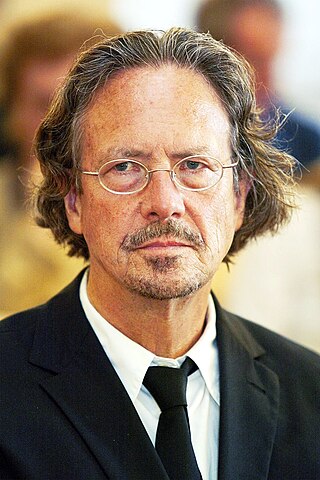
Peter Handke is an Austrian novelist, playwright, translator, poet, film director, and screenwriter. He was awarded the 2019 Nobel Prize in Literature "for an influential work that with linguistic ingenuity has explored the periphery and the specificity of human experience." Handke is considered to be one of the most influential and original German-language writers in the second half of the 20th century.

Ernst Wilhelm "Wim" Wenders is a German filmmaker and author, who is a major figure in New German Cinema. Among the honors he has received are prizes from the Cannes, Venice, and Berlin film festivals. He has also received a BAFTA Award and been nominated for three Academy Awards and a Grammy Award.

Wings of Desire is a 1987 romantic fantasy film written by Wim Wenders, Peter Handke and Richard Reitinger, and directed by Wenders. The film is about invisible, immortal angels who populate Berlin and listen to the thoughts of its human inhabitants, comforting the distressed. Even though the city is densely populated, many of the people are isolated or estranged from their loved ones. One of the angels, played by Bruno Ganz, falls in love with a beautiful, lonely trapeze artist, played by Solveig Dommartin. The angel chooses to become mortal so that he can experience human sensory pleasures, ranging from enjoying food to touching a loved one, and so that he can discover human love with the trapeze artist.
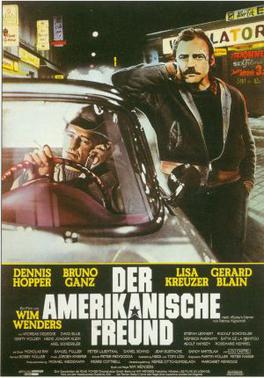
The American Friend is a 1977 neo-noir film written and directed by Wim Wenders, adapted from the 1974 novel Ripley's Game by Patricia Highsmith. It stars Dennis Hopper as career-criminal Tom Ripley and Bruno Ganz as Jonathan Zimmermann, a terminally ill picture framer whom Ripley coaxes into becoming an assassin. The film uses an unusual "natural" language concept: Zimmermann speaks German with his family and his doctor, but English with Ripley and while visiting Paris.

Fear in the Night is an American 1947 film noir crime film directed by Maxwell Shane, starring Paul Kelly and DeForest Kelley. It is based on the Cornell Woolrich story "And So to Death". Woolrich is credited under pen name William Irish. The film was remade by the same director in 1956 with the title Nightmare this time starring Edward G. Robinson playing the cop and Kevin McCarthy.
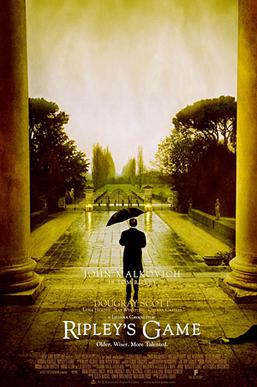
Ripley's Game is a 2002 thriller film directed by Liliana Cavani. It is adapted from the 1974 novel Ripley's Game, the third in Patricia Highsmith's series about the murderous adventures of the anti-hero Tom Ripley. John Malkovich stars as Ripley, opposite Dougray Scott and Ray Winstone. The film grossed $6.2 million on a budget of $30 million, making it a box-office failure; although it received positive reviews. Highsmith's novel was previously adapted in 1977 as The American Friend by director Wim Wenders, starring Dennis Hopper and Bruno Ganz.
Hide and Creep is an American horror/comedy film released in 2004. This film was based on an earlier short named "Birthday Call". Both the film and the short were directed by Chuck Hartsell and Chance Shirley, and were written by Chance Shirley. The film was produced by Crewless Productions, an Alabama based independent production company. Hide and Creep had its world premiere September 23, 2004 at the Sidewalk Moving Picture Festival in Birmingham, Alabama.

The End of Violence is a 1997 American drama film by the German director Wim Wenders. The film's cast includes Bill Pullman, Andie MacDowell, Gabriel Byrne, Traci Lind, Rosalind Chao, and Loren Dean, among others. It also features a soundtrack marked with the signature sounds of Wenders regulars Jon Hassell, Ry Cooder, and Bono. The film was praised by a select few critics for its cinematography, but performed poorly in the box office. It was entered into the 1997 Cannes Film Festival.
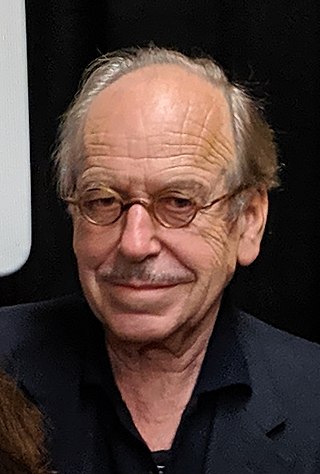
Rüdiger Vogler is a German film and stage actor.

Alice in the Cities is a 1974 German road movie directed by Wim Wenders. It is the first part of Wenders' "Road Movie trilogy", which also includes The Wrong Move (1975) and Kings of the Road (1976). The film was shot in black and white by Robby Müller, and contains several long scenes without dialogue.
![<i>The Wrong Move</i> 1975 [[West Germany]] film](https://upload.wikimedia.org/wikipedia/en/1/16/Wrong_move.jpg)
The Wrong Move is a 1975 German road movie directed by Wim Wenders. This was the second part of Wenders' "Road Movie trilogy" which included Alice in the Cities (1974) and Kings of the Road (1976).
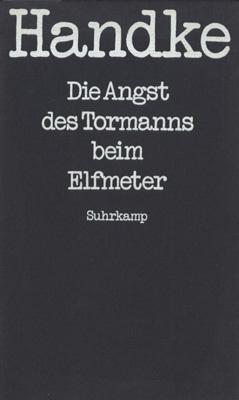
The Goalie's Anxiety at the Penalty Kick is a 1970 short novel by the Austrian Nobel prize winning writer Peter Handke. It was adapted into a 1972 film with the same title, directed by Wim Wenders.

Man Hunt is a 1941 American political thriller film, directed by Fritz Lang and starring Walter Pidgeon and Joan Bennett. It is based on the 1939 novel Rogue Male by Geoffrey Household and is set in Europe just prior to the Second World War. Lang had fled Germany into exile in 1933 and this was the first of his four anti-Nazi films, which include Ministry of Fear, Hangmen Also Die!, and Cloak and Dagger. It was Roddy McDowall's first Hollywood film after escaping London following the Blitz. Man Hunt was one of many films released in 1941 that were considered so pro-British that they influenced neutral members of the U.S. public to sympathize with the British side in World War II.
Dead Tone is a 2007 American slasher film directed and written by Brian Hooks and Deon Taylor. It stars Hooks, Antwon Tanner, Cherie Johnson, Rutger Hauer, German Legarreta, Gwendoline Yeo and Aimee Garcia.
The Death Wish franchise is an American vigilante action-thriller film series based on the 1972 novel by Brian Garfield. The films follow the character Paul Kersey, portrayed by Charles Bronson in the original series, and Bruce Willis in the 2018 remake. While the first film received mixed reviews, the subsequent sequels, as well as the remake, were panned by critics. The series made $87 million against a combined production budget of $61 million. Charles Bronson was the only actor to have appeared in all five films.

Detective David Tapp is a fictional character from the Saw film franchise, portrayed by Danny Glover. Introduced in Saw (2004), he is a police detective investigating a series of crime scenes linked to the same murderer, later revealed to be the Jigsaw Killer, and serves as one of the film's protagonists. Tapp has also made appearances through archived footage and from being mentioned in Saw III (2006), Saw IV (2007), and Saw V (2008). He appeared as a playable character in both Saw: The Video Game (2009), in which he was voiced by Earl Alexander, and Dead by Daylight (2016), in which he was voiced by Dave Blake.
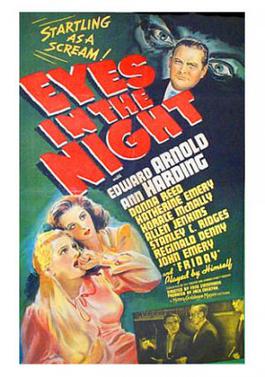
Eyes in the Night is a 1942 American crime mystery starring Edward Arnold, Ann Harding and Donna Reed. Directed by Fred Zinnemann, it is based on Baynard Kendrick's 1941 novel The Odor of Violets.

Night Passage is a crime novel by Robert B. Parker, the first in his Jesse Stone series.

Short Letter, Long Farewell is a 1972 novel by the Austrian writer Peter Handke. It tells the story of a young Austrian writer who travels across the United States in search of his wife from whom he is estranged. The film-director John Ford appears as a character who brings resolution at the end of the road on the coast of California. His film Young Mr. Lincoln also serves as a point of reference and an antidote to the alienation experienced by the stranger crossing the States. The novel shares many themes and motifs with the film Alice in the Cities from 1974, directed by Handke's frequent collaborator Wim Wenders; the film can be seen as a response to the book.

There's Always a Price Tag is a 1956 crime thriller novel written by British author James Hadley Chase.










![<i>The Wrong Move</i> 1975 [[West Germany]] film](https://upload.wikimedia.org/wikipedia/en/1/16/Wrong_move.jpg)






